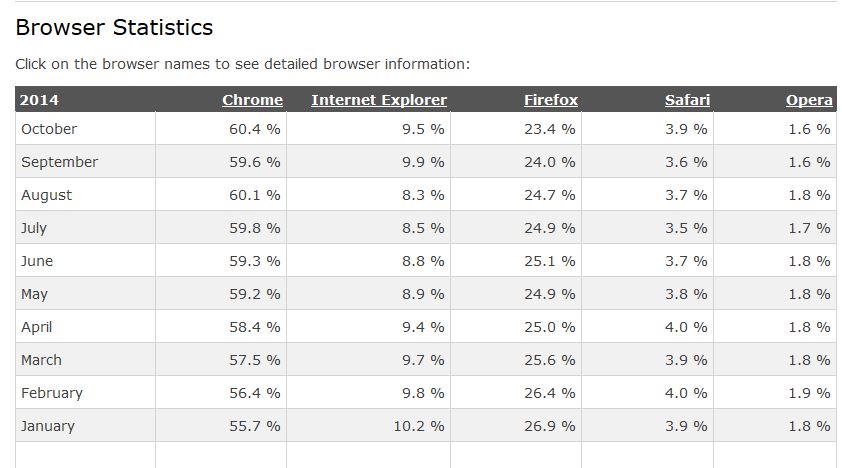Last night, Mozilla and Yahoo announced a new partnership. If you haven’t already heard the news, Yahoo will be now the default search provider for Mozilla’s Firefox search engine in the United States. What does this mean for SEOs and business owners?
Firefox is one of the top three browsers used today, according to statistics found on W3schools.com, second only to the ever-increasingly popular Google Chrome. It has been experiencing a slight wane in popularity, handing a few percentage points to Google Chrome over the course of 2014, as you can see in the graph below.
As Greg Sterling over at SearchEngineLand pointed out, the preview on Yahoo’s Tumblr of the new search experience that will be offered looks remarkably like a Google search engine results page.

According to the Washington Post, more than 100 billion searches a year are attributed to Firefox. It will certainly be of extraordinary interest to see how much of those searches are handed off to Yahoo, and subsequently how the Microsoft Bing-powered search engine performs. We hope Mozilla’s announcement page crash that occurred after the news release is not a portent of things to come.
Is your site ready to experience an influx of traffic from Yahoo related searches? Here are a few important things to keep in mind:
Bing Webmaster Tools
Remember, Yahoo utilizes the Microsoft Bing search engine, and Bing WT incorporates Yahoo traffic data in their charts. Make sure Bing Webmaster Tools is set up and tracking your website statistics properly. Need to get that started? Head over to Bing to follow their checklist to get set up.
“Keyword” Meta Tags
Declared to be dead over and over again, Yahoo has been known to have these as a ranking factor, albeit the lowest-valued of all their ranking factors. It still may behoove you to review whether or not you have these meta tags on your site, and whether they are appropriately utilized.
Bing/Yahoo Don’t Honor Canonical Tags The Same Way That Google Does
This has been the subject of much discussion – whether or not canonical elements are valued in the same way between the search engine giants. It’s better to err on the side of safety, so make sure you’re utilizing 301 redirect rules for instances where you could have canonical issues or duplicate content that’s profiled on multiple pages. The rel=”canonical” tag should work in many instances, but if there is a way of removing the redundancy, pursue that action.
How to Change Firefox Default Search Engine
If you don’t welcome the change, and want your results to be Google-provided without having to go to Google.com or ensure that Firefox’s search bar setting is set to Google – you can always just change the settings.
- Enter about:config in the URL bar in Firefox (it will throw up a few screens warning you to be careful)
- Search for keyword.url from the filter box
- Double click on the line that is highlighted. A dialog box will open where you can edit the ‘keyword.url’ string
- Change this string to whatever you want it to be, ex. https://duckduckgo.com/ or https://google.com

